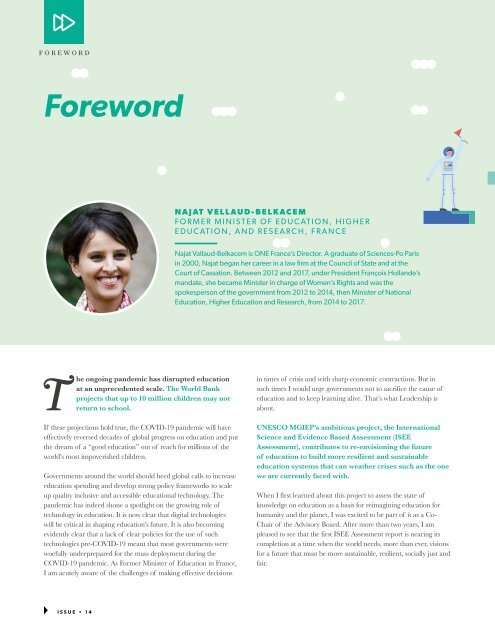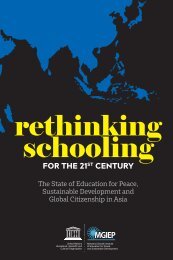The Blue DOT 14 - Multidisciplinary Science & Evidence For Education
Welcome to the 14th edition of the Institute’s flagship publication, The Blue DOT. In this edition, we bring to you news of the International Science and Evidence-based Education Assessment (ISEE Assessment) that the Institute embarked on about 18 months ago. The International Science and Evidence-based Education (ISEE) Assessment contributes to re-envisioning the future of education and feeds into UNESCO's Futures of Education report, today constituting over 250 authors from 70 countries. Read Opinion Pieces by thought-leaders, experts and academics, watch interviews with our advisory board members and explore the learnings of our research fellows while navigating experience of the Multidisciplinary Science & Evidence for Education.
Welcome to the 14th edition of the Institute’s flagship publication, The Blue DOT. In this edition, we bring to you news of the International Science and Evidence-based Education Assessment (ISEE Assessment) that the Institute embarked on about 18 months ago. The International Science and Evidence-based Education (ISEE) Assessment contributes to re-envisioning the future of education and feeds into UNESCO's Futures of Education report, today constituting over 250 authors from 70 countries. Read Opinion Pieces by thought-leaders, experts and academics, watch interviews with our advisory board members and explore the learnings of our research fellows while navigating experience of the Multidisciplinary Science & Evidence for Education.
You also want an ePaper? Increase the reach of your titles
YUMPU automatically turns print PDFs into web optimized ePapers that Google loves.
FOREWORD<br />
<strong>For</strong>eword<br />
FOREWORD<br />
NAJAT VELLAUD-BELKACEM<br />
FORMER MINISTER OF EDUCATION, HIGHER<br />
EDUCATION, AND RESEARCH, FRANCE<br />
Najat Vallaud-Belkacem is ONE France’s Director. A graduate of <strong>Science</strong>s-Po Paris<br />
in 2000, Najat began her career in a law firm at the Council of State and at the<br />
Court of Cassation. Between 2012 and 2017, under President François Hollande’s<br />
mandate, she became Minister in charge of Women’s Rights and was the<br />
spokesperson of the government from 2012 to 20<strong>14</strong>, then Minister of National<br />
<strong>Education</strong>, Higher <strong>Education</strong> and Research, from 20<strong>14</strong> to 2017.<br />
T<br />
he<br />
ongoing pandemic has disrupted education<br />
at an unprecedented scale. <strong>The</strong> World Bank<br />
projects that up to 10 million children may not<br />
return to school.<br />
If these projections hold true, the COVID-19 pandemic will have<br />
effectively reversed decades of global progress on education and put<br />
the dream of a “good education” out of reach for millions of the<br />
world’s most impoverished children.<br />
Governments around the world should heed global calls to increase<br />
education spending and develop strong policy frameworks to scale<br />
up quality inclusive and accessible educational technology. <strong>The</strong><br />
pandemic has indeed shone a spotlight on the growing role of<br />
technology in education. It is now clear that digital technologies<br />
will be critical in shaping education’s future. It is also becoming<br />
evidently clear that a lack of clear policies for the use of such<br />
technologies pre-COVID-19 meant that most governments were<br />
woefully underprepared for the mass deployment during the<br />
COVID-19 pandemic. As <strong>For</strong>mer Minister of <strong>Education</strong> in France,<br />
I am acutely aware of the challenges of making effective decisions<br />
in times of crisis and with sharp economic contractions. But in<br />
such times I would urge governments not to sacrifice the cause of<br />
education and to keep learning alive. That’s what Leadership is<br />
about.<br />
UNESCO MGIEP’s ambitious project, the International<br />
<strong>Science</strong> and <strong>Evidence</strong> Based Assessment (ISEE<br />
Assessment), contributes to re-envisioning the future<br />
of education to build more resilient and sustainable<br />
education systems that can weather crises such as the one<br />
we are currently faced with.<br />
When I first learned about this project to assess the state of<br />
knowledge on education as a basis for reimagining education for<br />
humanity and the planet, I was excited to be part of it as a Co-<br />
Chair of the Advisory Board. After more than two years, I am<br />
pleased to see that the first ISEE Assessment report is nearing its<br />
completion at a time when the world needs, more than ever, visions<br />
for a future that must be more sustainable, resilient, socially just and<br />
fair.<br />
What has drawn me in particular to the ISEE<br />
Assessment is its interdisciplinary nature.<br />
<strong>The</strong> role of education in shaping such a future is unquestionable.<br />
What has drawn me in particular to the ISEE Assessment<br />
is its interdisciplinary nature. <strong>The</strong> ongoing COVID-19<br />
pandemic has shown that most education systems around the<br />
world are not prepared to face the global pandemic and other<br />
future impending crises such as climate change. Diverse disciplines<br />
and sectors must join forces to address grand challenges we face.<br />
<strong>The</strong> pandemic and its consequences are threatening to undo<br />
the progress made on ensuring access to education over the last<br />
decades and seriously jeopardizing the chances of achieving the<br />
Sustainable Development Goals (SDGs). UNESCO MGIEP<br />
derives its mandate from SDG 4 on quality education and especially<br />
from SDG 4.7, which urges governments to equip all learners with<br />
“knowledge and skills needed to promote sustainable development”.<br />
<strong>The</strong>re is no doubt that the kinds of knowledge and skills required<br />
today include not simply classic “job ready” skills but also skills to<br />
navigate the rapidly changing, uncertain, and multicultural world,<br />
including empathy and emotional resilience. <strong>The</strong> pandemic<br />
provides an opportunity for us all to rethink the purpose<br />
of education and reorient curriculum and pedagogy to<br />
shape societies where all beings—both human and more<br />
than human life—can flourish.<br />
Together with the Advisory Board members, I sincerely<br />
congratulate the ISEE Assessment Panel for undertaking this<br />
first-of-its kind assessment at such an unprecedented time. I<br />
highly commend over 200 authors for joining forces and boldly<br />
illuminating fundamental challenges confronting education today. I<br />
hope it inspires policymakers’ and educators’ own efforts to address<br />
these challenges in the years to come.<br />
ISSUE • <strong>14</strong><br />
1 7

















